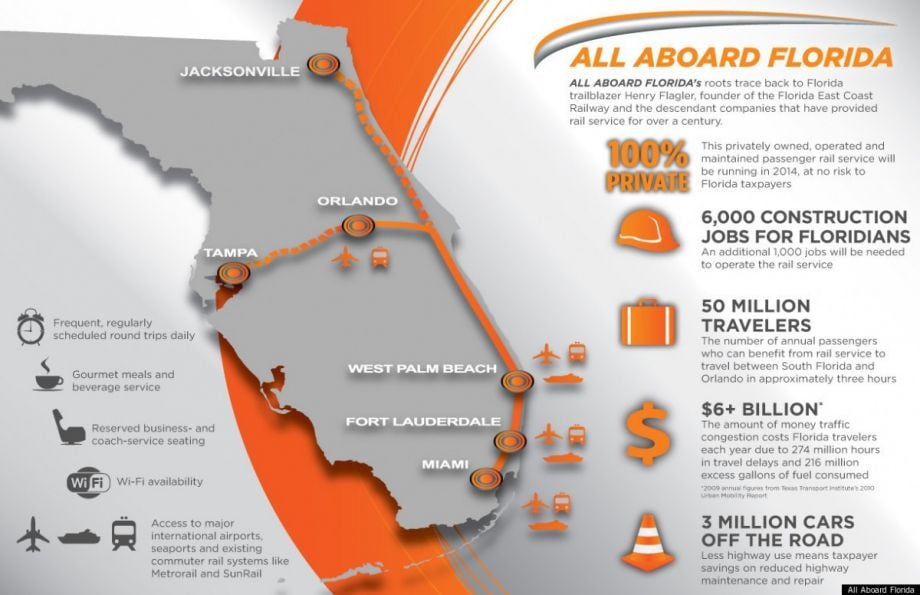When Florida East Coast Industries, which runs an eponymous freight rail line from Jacksonville to Miami, announced last year that it would start a private passenger rail service from Miami to Orlando, observers were stunned.
If it were anyone else, All Aboard Florida, as the venture is known, might have been written off as a pipe dream. But FECI’s reputation — and the hiring of industry heavyweight Gene Skoropowski, architect of Amtrak’s scrappy but growing Capitol Corridor service — lent credibility to the company’s efforts to become the first private passenger rail success story in over half a decade.
Now, details on how it intends to go about reviving passenger rail in Florida are emerging.
When FECI first announced its intentions, many thought it was a real estate play. That seemed unlikely, though, given the relatively small amount of property it owns around potential station locations. While Flagler Development, the railroad’s real estate arm, does own a lot of land throughout the state, most of it is in outlying industrial areas, not suitable for transit-oriented development. The one exception was a nine-acre plot in downtown Miami, with a formidable 3.5 million square feet of already-entitled development rights.
But in addition to that parcel — for which FECI is planning a massive station complex with 785 apartments, 820 hotel rooms, 1.5 million square feet of office space and nearly half a million square feet of retail space — the company appears on track to win another block near the station, according to the South Florida Business Journal.
The move also raises the question of whether something similar is planned for the Fort Lauderdale station, which the South Florida Sun-Sentinel speculates could sit just north of the Broward County Transit bus terminal.
Despite the prevalent notion that real estate supported turn-of-the-century American railroads and today’s private railroads in East Asia, a private rail operator could never succeed if it had to subsidize operating costs in perpetuity through land holdings. (Most railroads are profitable without real estate), though land holdings can bolster companies’ bottom lines and turn marginal projects into profitable ones.)
To that end, detailed numbers have also emerged about how All Aboard Florida plans to finance the scheme. Oscar Pedro Musibay at the Business Journal broke down how the company intends to pay the $2.4 billion in start-up costs (though the project is often referred to in other press accounts as costing just $1.5 billion):
- $1.4 billion in debt is needed to finance operations
- $300 million in debt financing is tied to the real estate
- $600 million will come from preferred equity
- $125 million will be FECI cash equity
What remains to be seen is what sort of aid, if any, FECI will get from various levels of government. While the railroad has been adamant that private money will fund its operations, it has left open the possibility of seeking a federal loan for the formidable capital costs.
In August it submitted a request to the Federal Railroad Administration for a low-interest loan of $632 million — a large sum of money by the standards of private American enterprise, but small compared to what public railroads get. Pretty much everyone expected FECI to ask for a federal loan, but now there’s another wrinkle: The request has been cancelled.
“This presolictation notice is cancelled due to a change in acquisition strategy for this requirement,” reads an August 22 note from the feds.
Whether that “change in acquisition strategy” means that FECI will forego federal money entirely, or whether it’s just adjusting the request, is unclear. All Aboard Florida declined requests for comment, and the FRA is unavailable to comment due to the governmental shutdown.
And then there are subsidies from other levels of government that they could take advantage of. Just today, after inking a deal with the Orlando International Airport for a station there, the Orlando Sentinel reported that “the pact approved Wednesday calls for the Orlando airport to seek a $200 million grant from the state to pay for a station about a mile south of the main terminal.”
The Works is made possible with the support of the Surdna Foundation.
Stephen J. Smith is a reporter based in New York. He has written about transportation, infrastructure and real estate for a variety of publications including New York Yimby, where he is currently an editor, Next City, City Lab and the New York Observer.

















